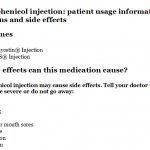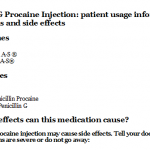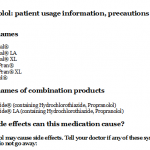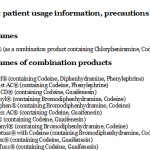
Rifampin: patient usage information, precautions and side effects
Tuesday, May 30, 2017 by Gregory Van Dyke
http://www.naturalnewsreference.com/2017-05-30-rifampin-patient-usage-information-precautions-and-side-effects.html
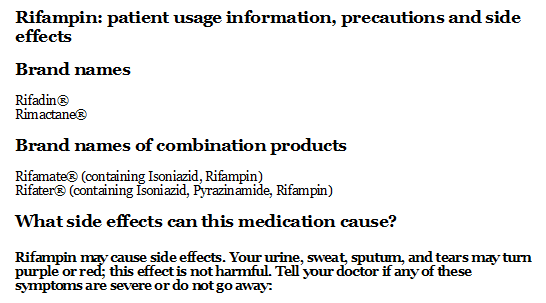
Rifampin: patient usage information, precautions and side effects
Brand names
Rifadin®
Rimactane®
Brand names of combination products
Rifamate® (containing Isoniazid, Rifampin)
Rifater® (containing Isoniazid, Pyrazinamide, Rifampin)
What side effects can this medication cause?
Rifampin may cause side effects. Your urine, sweat, sputum, and tears may turn purple or red; this effect is not harmful. Tell your doctor if any of these symptoms are severe or do not go away:
- itching
- flushing
- headache
- drowsiness
- dizziness
- lack of coordination
- difficulty concentrating
- confusion
- changes in behavior
- muscle weakness
- pain in the arms, hands, feet, or legs
- heartburn
- stomach cramps
- diarrhea
- gas
- painful or irregular menstrual periods
- vision changes
Some side effects can be serious. If you experience any of the following symptoms, call your doctor immediately:
- rash
- hives
- fever
- blisters
- swelling of the eyes, face, lips, tongue, throat, arms, hands, feet, ankles, or lower legs
- nausea
- vomiting
- loss of appetite
- dark urine
- joint pain or swelling
- yellowing of the skin or eyes
If you experience a serious side effect, you or your doctor may send a report to the Food and Drug Administration’s (FDA) MedWatch Adverse Event Reporting program online (http://www.fda.gov/Safety/MedWatch) or by phone (1-800-332-1088).
Rifampin may cause other side effects. Call your doctor if you have any unusual problems while you are taking this medication.
Why is this medication prescribed?
Rifampin is used with other medications to treat tuberculosis (TB; a serious infection that affects the lungs and sometimes other parts of the body). Rifampin is also used to treat some people who have Neisseria meningitidis (a type of bacteria that can cause a serious infection called meningitis) infections in their noses or throats. These people have not developed symptoms of the disease, and this treatment is used to prevent them from infecting other people. Rifampin should not be used to treat people who have developed symptoms of meningitis. Rifampin is in a class of medications called antimycobacterials. It works by killing the bacteria that cause infection. Antibiotics will not work for colds, flu, or other viral infections.
How should this medicine be used?
Rifampin comes as a capsule to take by mouth. It should be taken with a full glass of water on an empty stomach, 1 hour before or 2 hours after a meal. When rifampin is used to treat tuberculosis, it is taken once daily. When rifampin is used to prevent the spread of Neisseria meningitidis bacteria to other people, it is taken twice daily for two days. Follow the directions on your prescription label carefully, and ask your doctor or pharmacist to explain any part you do not understand. Take rifampin exactly as directed. Do not take more or less of it or take it more often than prescribed by your doctor.
Tell your doctor or pharmacist if you cannot swallow the capsules. Your pharmacist can prepare a liquid for you to take instead.
If you are taking rifampin to treat tuberculosis, your doctor may tell you to take rifampin for several months or longer. Continue to take rifampin until you finish the prescription even if you feel better, and be careful not to miss doses. If you stop taking rifampin too soon, your infection may not be completely treated and the bacteria may become resistant to antibiotics. If you miss doses of rifampin, you may develop uncomfortable or serious symptoms when you begin to take the medication again.
Other uses for this medicine
Rifampin is also sometimes used to treat infections caused by other types of bacteria and to prevent infection in people who have been in close contact with a person who has certain serious bacterial infections. Talk to your doctor about the risks of using this medication for your condition.
This medication may be prescribed for other uses; ask your doctor or pharmacist for more information.
What special precautions should I follow?
Before taking rifampin,
- tell your doctor and pharmacist if you are allergic to rifampin, rifabutin (Mycobutin), rifapentine (Priftin), any other medications, or any of the ingredients in rifampin capsules. Ask your doctor or pharmacist for a list of the ingredients.
- tell your doctor if you are taking any of the following medications: atazanavir (Reyataz), darunavir (Prezista), fosamprenavir (Lexiva), saquinavir (Invirase), tipranavir (Aptivus), or ritonavir (Norvir) and saquinavir (Invirase) taken together. Your doctor will probably tell you not to take rifampin if you are taking any of these medications.
- tell your doctor and pharmacist what prescription and nonprescription medications, vitamins, nutritional supplements, and herbal products you are taking or plan to take. Be sure to mention any of the following: anticoagulants (‘blood thinners’) such as warfarin (Coumadin); antifungals such as fluconazole (Diflucan), itraconazole (Onmel, Sporanox), and ketoconazole (Nizoral); atovaquone (Mepron, in Malarone); barbiturates such as phenobarbital; beta blockers such as atenolol (Tenormin), labetalol (Normodyne), metoprolol (Lopressor, Toprol XL), nadolol (Corgard), and propranolol (Inderal); calcium channel blockers such as dilitiazem (Cardizem, Tiazac, Dilacor), nifedipine (Adalat, Procardia), and verapamil (Calan, Covera, Isoptin, Verelan); chloramphenicol; clarithromycin (Biaxin); cyclosporine (Gengraf, Neoral, Sandimmune); dapsone; diazepam (Valium); doxycycline (Doryx, Monodox, Vibramycin); enalapril (Vaseretic); fluroquinolone antibiotics such as ciprofloxacin (Cipro); gemfibrozil (Lopid); haloperidol (Haldol); ; levothyroxine (Levoxyl, Synthroid); medications for irregular heartbeat such as digoxin (Lanoxin), disopyramide (Norpace), mexiletine, and quinidine; medications for seizures such as phenytoin (Dilantin); methadone (Dolophine, Methadose); narcotic medications for pain; oral medications for diabetes; probenecid (Probalan); quinine (Qualquin); steroids such as dexamethasone (Decadron), methylprednisolone (Medrol), and prednisone; trimethoprim and sulfamethoxazole (Bactrim, Septra); tacrolimus; (Prograf); theophylline (Theochron, Theolair); tricyclic antidepressants such as amitriptyline (in Limbitrol) and nortriptyline (Pamelor); and zidovudine (Retrovir, in Trizivir). Many other medications may interact with rifampin, so be sure to tell your doctor about all the medications you are taking, even those that do not appear on this list. Your doctor may need to change the doses of your medications or monitor you carefully for side effects.
- if you are taking antacids, take them at least 1 hour after you take rifampin.
- tell your doctor if you are taking or using hormonal contraceptives (birth control pills, patches, rings, implants, and injections). Rifampin can decrease the effectiveness of hormonal contraceptives. You should use another method of birth control while taking this medication. Talk to your doctor about birth control while taking rifampin.
- tell your doctor if you have or have ever had diabetes, porphyria (condition in which certain natural substances build up in the body and may cause stomach pain, changes in thinking and behavior, or other symptoms), any condition that affects your adrenal gland (small gland next to the kidney that produces important natural substances) or liver disease.
- tell your doctor if you are pregnant, plan to become pregnant, or are breast-feeding. If you become pregnant while taking rifampin, call your doctor.
- tell your doctor if you wear soft contact lenses. Rifampin may cause permanent red stains on your contact lenses.
What special dietary instructions should I follow?
Unless your doctor tells you otherwise, continue your normal diet.
What should I do if I forget a dose?
Do not miss doses of rifampin. Missing doses may increase the risk that you will experience serious side effects. If you do miss a dose, take the missed dose as soon as you remember it. However, if it is almost time for the next dose, skip the missed dose and call your doctor. Do not take a double dose to make up for a missed one.
What should I know about storage and disposal of this medication?
Keep this medication in the container it came in, tightly closed, and out of reach of children. Store it at room temperature and away from excess heat and moisture (not in the bathroom). Throw away any medication that is outdated or no longer needed. Talk to your pharmacist about the proper disposal of your medication.
In case of emergency/overdose
In case of overdose, call your local poison control center at 1-800-222-1222. If the victim has collapsed or is not breathing, call local emergency services at 911.
Symptoms of overdose may include:
- nausea
- vomiting
- stomach pain
- itching
- headache
- loss of consciousness
- yellowing of the skin or eyes
- reddish brown discoloration of the skin, saliva, urine, feces, sweat, and tears
- tenderness in the upper right part of the stomach
- swelling of the eyes or face
- fast or irregular heartbeat
- seizures
What other information should I know?
Keep all appointments with your doctor and the laboratory. Your doctor will order certain lab tests to check your response to rifampin.
Before having any laboratory test, including drug screening tests, tell the laboratory personnel that you are taking rifampin. Rifampin may cause the results of certain drug screening tests to be positive even though you have not taken the drugs.
Do not let anyone else take your medication. Ask your pharmacist any questions you have about refilling your prescription.
It is important for you to keep a written list of all of the prescription and nonprescription (over-the-counter) medicines you are taking, as well as any products such as vitamins, minerals, or other dietary supplements. You should bring this list with you each time you visit a doctor or if you are admitted to a hospital. It is also important information to carry with you in case of emergencies.
Why is this medication prescribed?
How should this medicine be used?
What special precautions should I follow?
What special dietary instructions should I follow?
What should I do if I forget a dose?
What side effects can this medication cause?
What should I know about storage and disposal of this medication?
What other information should I know?
Brand names of combination productshttps://medlineplus.gov/druginfo/meds/a682403.html
Tagged Under: Tags: chemical medicine, medication, Pharma, Prescription Medicine

